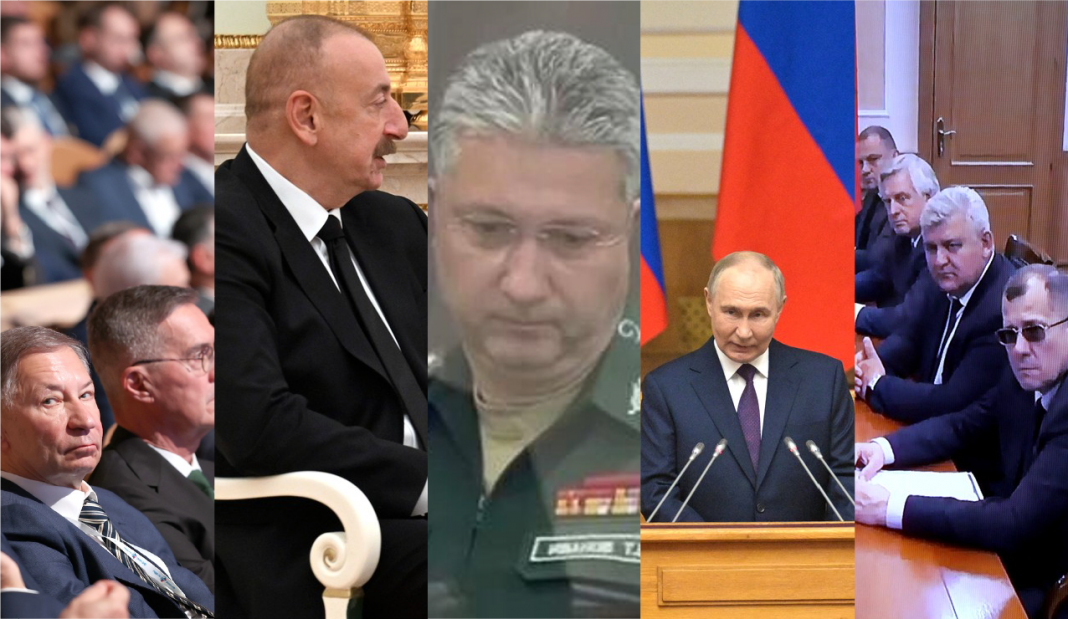This report describes the key events which significantly influenced Russia’s political, economic, and social processes.
Assessing the past week’s results, we determine the following trends:
- The case of Timur Ivanov became one of Russia’s main political events last week and caused a real stir in the political life of Russia. Now, questions arise for several people in the immediate circle of Defense Minister Sergei Shoigu. According to available data, First Deputy Minister Ruslan Tsalikov, Shoigu’s closest ally for the past 20 years, may be dismissed. The searches took place at the office of Deputy Minister Tatyana Shevtsova, who is responsible for finance at the ministry. Shoigu’s very continued tenure as Minister of Defense is in question.
- Aliyev’s visit to Moscow finally consolidates the new system of relations between Moscow and Baku. For Putin and Aliyev, 2024 is an important year: both went through presidential elections and received a mandate for the next presidential terms. In addition, both Azerbaijan and Russia have recently been building a system of close relations with China (Xi Jinping’s Special Representative for European Affairs, Wu Hongbo, visited Baku on March 8, and Special Representative for Eurasian Affairs, Li Hui, visited Moscow on March 3).
- Despite the complexity of the situation and the sharp increase in protest activity in the flood-affected regions of Russia, neither Ukraine nor Western countries tried to take advantage of the opportunity to further destabilise the situation in order to divert Russia’s attention to internal problems. In many ways, this demonstrates the inability of the information warfare mechanism to quickly respond to such situations and implement situational strategies. In fact, despite the huge number of strategic centres and analytical structures, Russia still remains poorly studied and incomprehensible to most of its opponents.
This report highlights the most relevant topics for Russia between the 22nd and the 28th of April, namely:
- The case of Deputy Minister of Defense Timur Ivanov;
- Meeting of Vladimir Putin with the President of Azerbaijan, Ilham Aliyev;
- 50th anniversary of the start of construction of the Baikal-Amur Mainline;
- Meeting on liquidation of flood consequences;
- Plenary meeting of the Russian Union of Industrialists and Entrepreneurs;
- Meeting of the Council of Legislators;
- Meeting on economic issues;
- Russian veto on the UN Resolution on preventing an arms race in space.
This Content Is Only For Subscribers
- The case of Deputy Minister of Defense Timur Ivanov
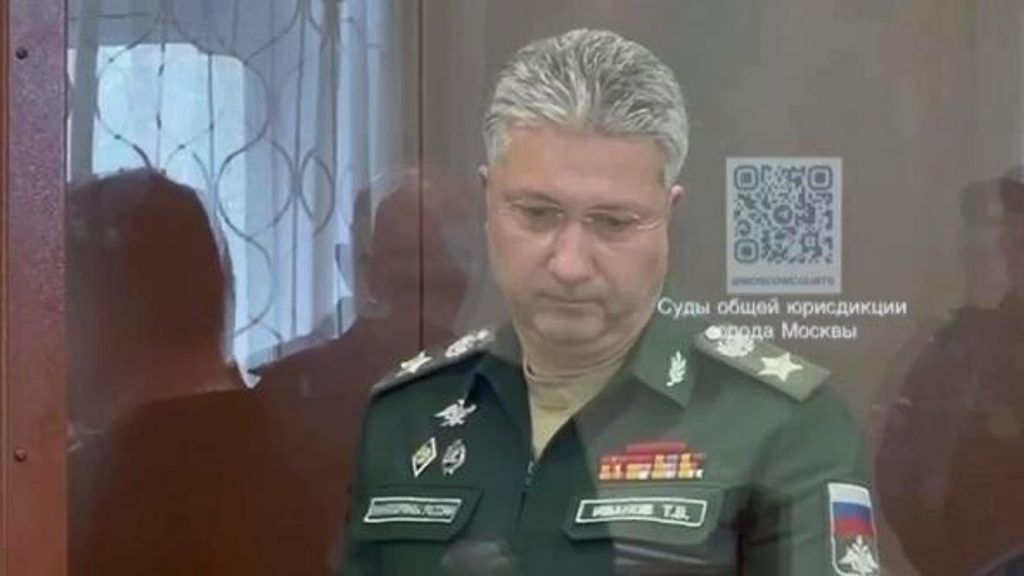
On Tuesday, April 23, Russian media announced the detention of Deputy Minister of Defense of the Russian Federation Timur Ivanov. Later, this information received official confirmation. Notably, on the same day, a board meeting of the Ministry of Defense was held, at which both Shoigu and Ivanov were present, and by 17:00, the latter was detained. Officially, he was accused of corruption. Ivanov was charged under Part 6 of Art. 290 of the Criminal Code of the Russian Federation (receiving a bribe on a vast scale, up to 15 years in prison). Ivanov did not admit his guilt. According to his lawyer, Murad Musaev, Ivanov is accused of allegedly “assisting certain contractor companies of the Ministry of Defense.” In return, these companies “carried out construction and repair work free of charge at facilities that allegedly belonged to Ivanov.” Sometime later, Sergei Shoigu signed a decree dismissing Ivanov from his position.
The next day, April 24, Timur Ivanov was arrested. Many observers noted that he was still wearing a military uniform with shoulder straps and metal bars at the trial – supposedly a rarity for high-ranking defendants in criminal cases. In the video of him being taken out of the courthouse, Ivanov was already in civilian clothes, and handcuffs could be seen on his wrists.
In this context, it is essential to note that Timur Ivanov has held the Deputy Minister of Defense post since 2016. He is called a longtime ally and friend of Sergei Shoigu: in 2012, Ivanov was deputy prime minister in the government of the Moscow region, which Shoigu then headed.
At the Ministry of Defense, Ivanov oversaw major military construction projects in recent years: the restoration of occupied Mariupol, the construction of the main temple of the Russian Armed Forces, the Vostochny cosmodrome, and medical centres for the treatment of patients with COVID-19.
Outcomes and outlook:
The case of Timur Ivanov caused a real stir in the political life of Russia. Now, questions arise for a number of people in the immediate circle of Defense Minister Sergei Shoigu. According to available data, First Deputy Minister Ruslan Tsalikov, Shoigu’s closest ally for the past 20 years, may be dismissed. The searches took place at the office of Deputy Minister Tatyana Shevtsova, who is responsible for finance at the ministry. Shoigu’s very continued tenure as Minister of Defense is in question.
According to Ascolta sources, Shoigu has recently been unable to communicate with Vladimir Putin. Until now, Shoigu was part of the president’s inner circle, and is also friends with Sergei Chemezov. However, he has tense relations with the Kovalchuk group. Many assume that the Ivanov case did not appear by chance right now, on the eve of forming a new government, and wonder whether the whole case is not an operation to remove Shoigu. There is an opinion among experts that Ivanov’s case is revenge on Shoigu and his entourage for the liquidation of Prigozhin and the Wagner PMC (in the highest circles, there are many who patronised the Wagnerites; namely, Ivanov was the initiator of the conflict between the Ministry of Defense and Prigozhin).
But it is clear that if Putin makes concessions to this group and removes Shoigu from his ministerial position, outspoken hawks and national patriots will take leading positions in the Ministry of Defense. That is why Ivanov’s case is important for the further development of the situation in Russia itself.
- Meeting of Vladimir Putin with the President of Azerbaijan, Ilham Aliyev
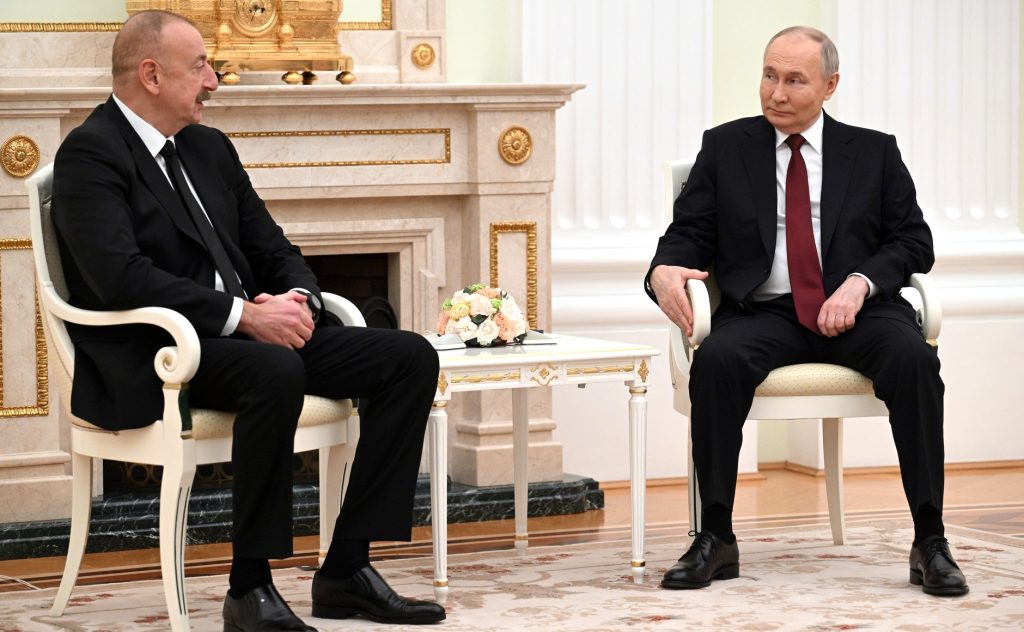
On Monday, April 22, Vladimir Putin met with President of Azerbaijan Ilham Aliyev, who arrived in Moscow on a working visit in honour of the festivities dedicated to the 50th anniversary of the construction of the Baikal-Amur Railway (BAM). At the beginning of the visit, the two countries’ presidents held a joint press conference. They later met with veteran construction workers and BAM workers and had a personal conversation.
Key theses:
- Putin: “Everyone knows well that your father played a significant role, headed a government commission, and visited construction sites often. He was one of the organisers of this grandiose project, important for the entire Soviet Union. We not only know this, we remember it and are very grateful to him; we keep the memory of it.”
- Putin: “Now we,” you probably know about this, “are developing the so-called Eastern training ground: the BAM and the Trans-Siberian Railway, everything connected with it. So all this matters to us, and it matters very much, even today.”
- Putin: “I am sure: all the efforts, labors, and years of work that your father invested in implementing this huge project still play a significant role today, not only for Russia but also for the entire Commonwealth of Independent States. I mean that many of our partners use this transport artery in one way or another.”
- Putin: “Of course, we will have the opportunity to talk about bilateral relations, which are at a high level and are developing. Our trade turnover is growing, reaching more than four billion dollars. In dollar terms, six billion is Russian investment in the Azerbaijani economy. The intergovernmental commission is working actively. And there are many interesting areas of cooperation in the real sector of the economy, in cooperation, in infrastructure – some of them, in my opinion, are well known to our countries’ public.”
- Putin: “Of course, we will also talk about the situation from the point of view of ensuring security in the region. There are a lot of questions here; they are very sensitive. We are with you in the material on each of them.”
- Aliyev: “In Azerbaijan, we very much appreciate the attitude towards the memory of Heydar Aliyevich, which we see in the Russian leadership and among the public.”
- Aliyev: “Such memorable moments in history bring our countries and peoples closer together and contribute to the further progressive development of our relations. We are very pleased with how our relations are developing. For more than two years now, we have been working within the framework of the Declaration on Allied Cooperation, which we signed here in the Kremlin in February 2022 and the main political document that predetermines the progressive development of our relations in the future.”
- Aliyev: “As you noted, the agenda is quite extensive. There is also a transport component, we will discuss this today. The North-South international transport corridor project, uniting our countries and partners, is of global importance for cargo transportation safety and for stimulating trade relations between many countries.”
- Aliyev: “Regional security issues are constantly on the agenda of our meetings. And we are also pleased with how they are being resolved. Russia is a fundamental country regarding regional security in the Caucasus and wider geography. And a lot depends on the actions and interactions between our countries. And we aim to strengthen measures of trust, cooperation, mutual understanding and resolve all issues in the spirit of interaction and mutual interests.”
Outcomes and outlook:
Vladimir Putin is interested in developing relations with Azerbaijan: these are opportunities to strengthen positions in the Caspian Sea, new agreements in the oil and gas sector, and additional ways to compromise with Turkey. For the sake of these relations, Putin actually went to lower the level of relations with Armenia (which, unlike Azerbaijan, is a member of the CSTO). In the Karabakh war, Russia de facto supported Azerbaijan.
The pro-Armenian lobby in Russia, which has such firm representatives as Sergei Lavrov and Mikhail Mishustin, was powerless to take any practical steps to correct the situation. The pro-Turkish group (Dmitry Peskov, Agalarovs, etc.) was more successful.
Aliyev’s visit to Moscow finally consolidated the new relations system between Moscow and Baku. For Putin and Aliyev, 2024 is an important year: both went through presidential elections and received a mandate for the following presidential terms. In addition, both Azerbaijan and Russia have recently been building a system of close relations with China (Xi Jinping’s Special Representative for European Affairs, Wu Hongbo, visited Baku on March 8, and Special Representative for Eurasian Affairs, Li Hui, visited Moscow on March 3).
Experts believe that one of the main points of the agreements was that Aliyev took upon himself the obligation to prevent the intensification of anti-Russian forces in the Caucasus (recently, much has been said that the West, in particular the British intelligence services, can intensify Islamist groups in “underbelly” of Russia, in particular in the Caucasus).
- 50th anniversary of the start of construction of the Baikal-Amur Mainline
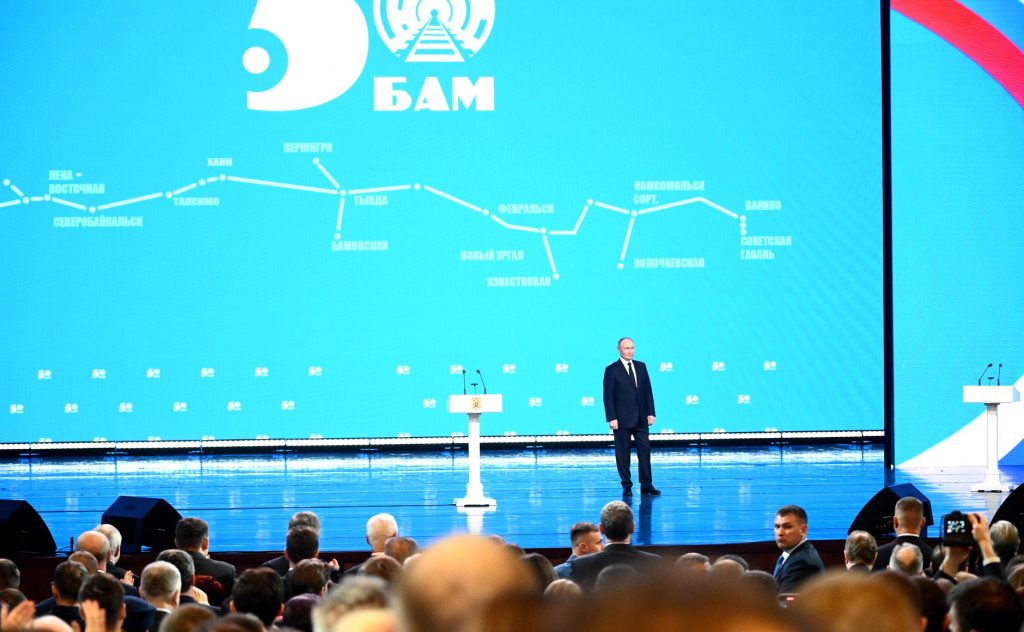
On Tuesday, April 23, a gala event was held in the Kremlin to mark the 50th anniversary of the start of construction of the Baikal-Amur Railway (BAM). Vladimir Putin delivered state awards to veteran construction workers and BAM workers and made an official address. In addition to builders and BAM workers, the event was attended by government officials, politicians, and leaders of other states.
Putin’s key theses:
- “Half a century ago, the construction of a unique transport route – the legendary Baikal-Amur Mainline – was launched. This project was historically necessary for our country. In the 19th century, the first proposals for the transport development of Transbaikalia and the Amur region appeared. At the beginning of the 20th century, the geography of the future grandiose construction project was studied, and even the route was traced. Before the Great Patriotic War and in the post-war years, separate sections were laid.”
- “I repeat, BAM has become a nationwide, all-Union project. Teams of hundreds of enterprises, research institutes, and design organisations from all republics of the Soviet Union took patronage of its objects.”
- “Participants in the construction of the BAM are present here. They implemented this, one of the world’s largest infrastructure projects of the entire XXth century, and laid a transport artery vital for the country.”
- “BAM played a huge role in the development of Eastern Siberia and the Far East, our North, made it possible to bring into circulation the richest deposits of coal, iron ore, tin, gold, copper, molybdenum, oil and gas, to use this powerful raw material base for the operation of combines and factories, factories, for the long-term development of domestic industry.”
- “At the turn of the century, the BAM helped open the markets of the Asia-Pacific region for the Russian economy, provided a reliable transit route for the whole of Eurasia, and, in conjunction with the Trans-Siberian Railway, became a truly strategic transport corridor of not only national but also global significance.”
- “This year, the highway’s carrying capacity will be almost 42 million tons. Over the past 12 years, it has tripled, and the volume of freight traffic along the BAM continues to grow.”
- “This year, we are launching the next, already third, stage of development of the BAM and Trans-Siberian Railways, increasing the capacity of the Eastern railway range. This strategic decision has been made, and the Government has issued the necessary regulatory documents. Of course, now it’s a matter of practical implementation. But work is already underway.”
- “We will pay special attention to improving the quality of life of people in settlements connected to the BAM. In particular, based on well-developed master plans, the strongholds and “capitals” of the BAM – Tynda and Severobaikalsk – will receive long-term development. We owe a lot of debt to the people here.”
- “I am confident that we will definitely implement all our plans; we will do it for the benefit of Russia and our people.”
Outcomes and outlook:
Activation and updating of the almost forgotten infrastructure project of the Brezhnev era indicates that Russia intends to develop the region of Transbaikalia and the Far East seriously. This will further link the Russian economy with the Chinese economy. In addition, the BAM will make the defence system more manoeuvrable and will ensure faster transit of goods by rail. For the average person in Russia, this is also a symbolic gesture: Putin is returning to projects abandoned in the late Soviet era, during Perestroika and the collapse of the USSR. That is, this is a signal for those who are nostalgic for the Soviet Union and for those who want to revive the empire.
- Meeting on liquidation of flood consequences
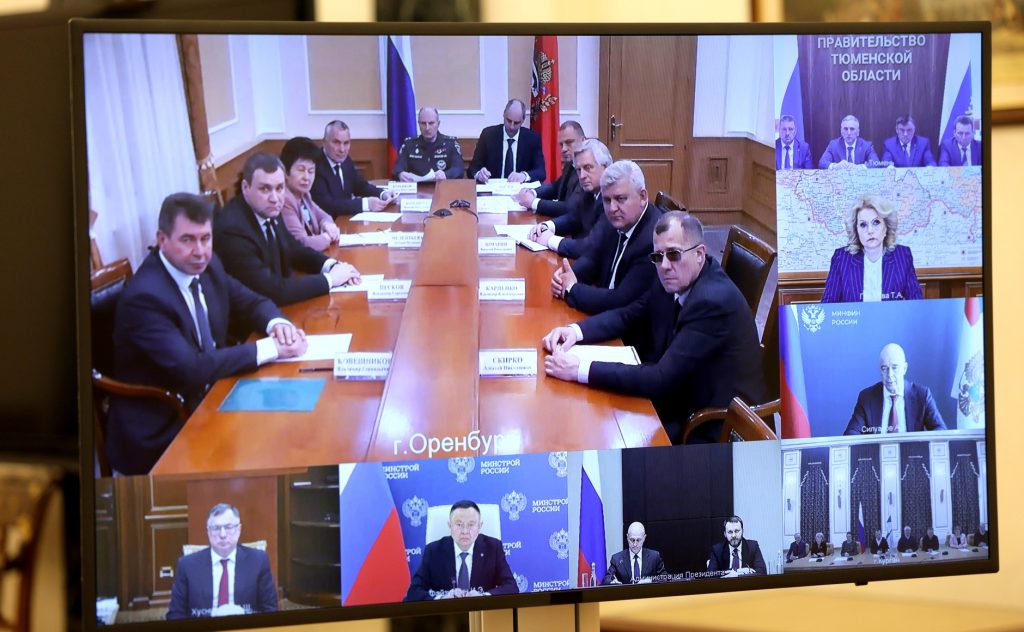
On Wednesday, April 24, Vladimir Putin held a meeting via video conference to resolve the consequences of floods in the Orenburg, Kurgan, and Tyumen regions. Government members, including heads of relevant ministries and, regions and municipalities affected by the flood, attended the meeting.
Key theses:
- Putin: “Today, the most difficult situation remains in the Orenburg region. Several settlements are still flooded, and the water level is falling slowly.”
- Putin: “According to incoming reports, sufficient forces and means have been deployed to eliminate the consequences of the disaster. Rescuers, colleagues on the ground, employees of other federal departments, security and law enforcement agencies, and, I especially note, volunteers, act professionally and harmoniously.”
- Putin: “Please note: I consider it necessary to meet again in a larger format and discuss the whole range of issues related to preventing and protecting populated areas from floods. As we see, there are systemic, organisational and management problems here. It is necessary to clearly define what measures the Federation, regions, and local authorities must take here. In particular, we will consider how existing hydraulic structures meet the established requirements and how programs for the construction, renovation and maintenance of dams and other engineering facilities are being implemented to protect territories from the negative effects of water.”
- Kurenkov (Minister of Civil Defense, Emergency Situations and Disaster Relief): “In the Orenburg region in the cities of Orsk and Orenburg, the water level has dropped below the dangerous phenomenon level. In the village of Ilek, there is also a decrease. The data that comes from gauging stations, combined with information about the influx of water into the Iriklinskoye reservoir, as well as about the discharges made, allows us to say that the flood wave on the Ural River passed the Orenburg region.”
- Kurenkov: “Today, in 58 settlements of the region and 43 private residences, more than 12 thousand residential buildings, almost 20 thousand household plots and 16 low-water bridges remain flooded. There are 625 people, including 100 children, in 16 temporary accommodation centres.”
- Kurenkov: “In the Kurgan region, a wave of floods has passed the city of Kurgan and is approaching the border with the Tyumen region. Here, thanks to pre-planned and implemented preventive measures, the catastrophic consequences of the spring flood were avoided.”
- Kurenkov: “Today, in the region, in 34 settlements out of 110 private residences, more than two thousand residential buildings and almost 3.5 thousand country houses, over six thousand personal plots, six low-water bridges and 18 sections of highways remain flooded. There are 487 people in 12 temporary accommodation centres, including 120 children.”
- Kurenkov: “As for the Tyumen region, the flood wave along the Ishim River is approaching the village of Abatskoye. High levels of water discharges from the Sergeevskoe reservoir on the territory of Kazakhstan remain, which poses a threat to the section of the federal highway P-402 Tyumen—Omsk.”
- Kurenkov: “Today, in the region, 20 settlements, 155 residential buildings and more than 500 country houses, more than 2,700 household plots, 13 low-water bridges, and 17 sections of highways remain flooded. There are 506 people in 26 temporary accommodation centres, including 186 children. More than 320 applications for financial assistance were submitted, and 87 families received payments.”
- Faizullin (Minister of Construction and Housing and Communal Services): “The main task today for the Orenburg region is to assess the damage to 25,331 individual residential buildings, 329 apartment buildings, 115 social facilities, 61 housing and communal services facilities, and 47 low-water bridges. We are working with executive authorities on surveying social and cultural facilities, roads, bridges, housing and communal services, and social facilities. Today, work continues to assess those houses freed from water.”
- Faizullin: “In Orsk, 6,995 houses have been flooded since the beginning of the flood period; the relevant commission inspected 3,384 [houses] in Orsk. Orenburg – 6642 houses, of which 376 were freed from water. Today, the commission inspected 72 houses, and the work continues. In the city of Buzuluk – 571 houses and 172 objects were examined. There are 6,670 houses in the Orenburg region; 165 are now free of water, and working groups are starting to go to these facilities. There are 21 houses in the Ilek district and 28 houses in the Sakmar district. These houses have not yet been approached because they have not been cleared of water.”
- Faizullin: “If we take the Kurgan region, we have a total scope of tasks: 2,377 residential buildings, including individual housing construction in private residences, 18 roads and six bridges, energy facilities, and social and cultural facilities. But they have not yet freed themselves from the water. 2,113 residential buildings, 3,405 country houses, six bridges, and eleven sections of roads remain flooded.”
- Putin: “First. In our country, the cost of major repairs of one meter of housing was previously determined by the relevant Government resolution and was not indexed in any way. But, despite all our attempts to contain the rise in prices, inflation is already taking place; we need to pay special attention to this: we need to look at the real cost of major repairs today and, if necessary, and I think there is such a need, change this norm.”
- Putin: “Second. Our payment amount was set in 2008; now it is 2024, and this amount has not been indexed. I ask the relevant federal departments—the Ministry of Emergency Situations, the Ministry of Finance, the Ministry of Construction, and social departments—to return to this and resolve the indexation issue. Remember that today there are 10,000, 50,000, and 100,000 rubles—they need to be indexed.”
- Putin: “Third. The issue is so delicate; it is linked with employers, but if a person is now forced to rebuild his household and, of course, must also go to work, additional difficulties arise for people. “I ask governors and local employers, and if someone works in federal institutions or companies with state participation, to also discuss this with employers and resolve the issue of additional leaves.”
Outcomes and outlook:
A practical meeting is essential for understanding the disaster’s consequences and preventing similar future disasters. The political component is minimal, but the information effect is aimed at the news product’s consumer to show how the authorities care about those affected by the disaster.
The meeting once again demonstrates that the factor of unpreparedness for such cataclysms forces the Kremlin to demonstrate active involvement and, in fact, “put out fires” without being able to prevent them. Floods in several regions of Russia have once again exposed a severe problem with the theft of budget funds allocated for the construction of infrastructure facilities and the negligence of many officials in the field.
Another important aspect is that despite the situation’s complexity and the sharp increase in protest activity in the affected regions, neither Ukraine nor Western countries tried to take advantage of the opportunity to destabilise the situation further to divert Russia’s attention to internal problems. In many ways, this demonstrates the inability of the information warfare mechanism to respond to such conditions and implement situational strategies quickly. In fact, despite the significant number of strategic centres and analytical structures, Russia still remains poorly studied and incomprehensible to most of its opponents.
- Plenary meeting of the Russian Union of Industrialists and Entrepreneurs
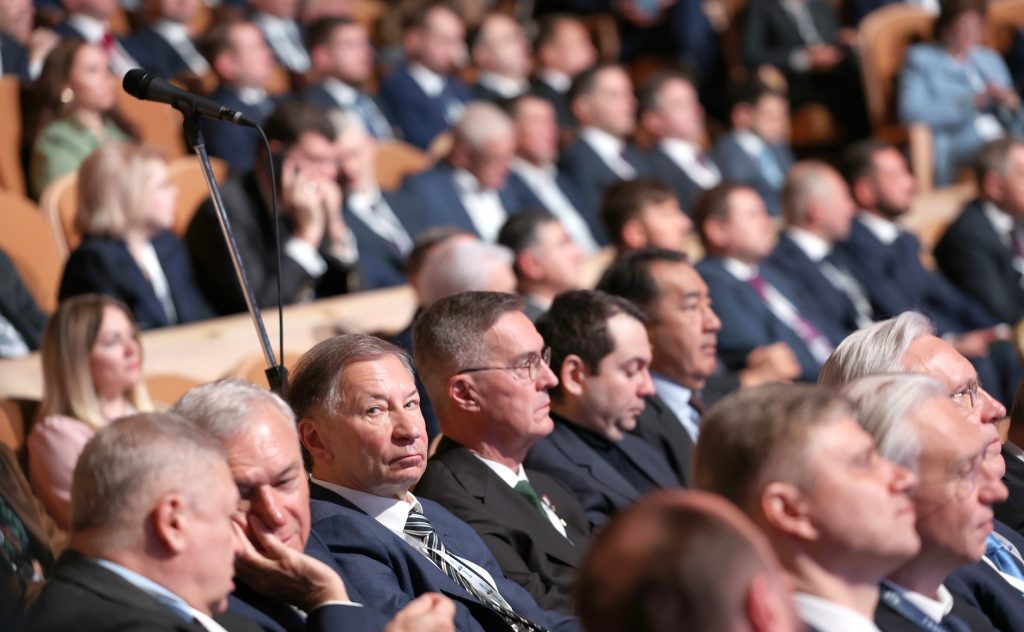
On Thursday, April 25, the annual congress of the Russian Union of Industrialists and Entrepreneurs took place in Moscow. Vladimir Putin also took part in the congress’s plenary session and addressed the event participants with an official address. During his speech, the Russian President once again recalled Russian entrepreneurs’ difficulties in recent years and thanked everyone for their work.
Key theses:
- Putin: “The Russian Union of Industrialists and Entrepreneurs (the RSPP) must always have its own clear, balanced, as a rule, position and specific proposals on how to make national development more sustainable and dynamic, how to make this process more sustainable and dynamic, so that this development leads not only to increasing the competitiveness of our economy but also improving the quality of life of citizens and increasing the income of Russian families. I hope that today, during the planned discussion, we will discuss tasks requiring joint efforts of the state, society and business.”
- Putin: “Despite the unprecedented challenges we have faced in recent years, positive trends are strengthening the domestic economy. At the end of last year, Russia’s GDP, as you know, increased by 3.6 per cent. Statistics from the first months of this year show that it continues to demonstrate good rates: in January of this year – 4.6 per cent in annual terms; in February – 7.7 per cent in annual terms; in the first two months [of the current year] an average of six per cent growth.”
- Putin: “Industrial production is growing. In January-February – by 6.6 per cent. It is supported by active domestic demand, which is based on the growth of real wages and incomes of citizens. According to estimates, retail trade turnover was 10.7 per cent higher than a year earlier in the first two months of this year. The average monthly salary in real terms in January of this year increased by 8.5 per cent, and the real disposable income of citizens in 2023 increased by 5.4 per cent, as is known.”
- Putin: “Today in Russia, there is recorded low unemployment – less than three per cent. What is especially important is that we have reduced its so-called structural component, that is, youth unemployment and unemployment in those regions and settlements where it was historically high have significantly decreased. It remains higher there than the national average in these regions: let’s say, in the North Caucasus, it was high – what we have there, in my opinion, is 10 [per cent]… Youth [unemployment] was 10.7, and now it’s 6.7, but in the North Caucasus, [unemployment] was 13.9 [per cent], but dropped to 9.7 – by almost four percentage points, decently. There is more than the national average, but there is a decrease there too.”
- Putin: “The state will continue to support businesses so that they launch promising projects, increase capital investments, and create new jobs—in a word, act both in business interests and work to improve the well-being of citizens, to improve the well-being of Russian families.”
- Putin: “First, we will ensure maximum predictability of conditions for conducting and developing business. I am sure that, of course, everyone has many questions on this topic. Still, we will move along this path, including having already instructed to expand the horizon of public finance planning. It will cover the next three years and make it possible to set up basic government expenditures further over six years.”
- Putin: “Another important step to improve the investment climate should be adjusting the tax system. As you know, the Government, with business and public associations, constituent entities of the Federation, and the Parliament, is working on this important issue, discussing the parameters of changes and preparing appropriate proposals.”
- Putin: “Secondly, the RSPP, together with other business associations, is doing a lot to de-bureaucratise the business environment, helping to simplify or convert administrative procedures and approvals into electronic form, and helping the Government improve legislation and control and supervisory activities. We have made significant progress in this complex and detailed work through joint efforts. And I want to thank everyone who contributes to this work.”
- Putin: “Third, in the next six years, we need to increase the volume of industrial production radically by tens of per cent. Moreover, new enterprises, including high-tech ones, in critical areas should appear everywhere.”
- Putin: “Russia’s strategic task is to increase the production of goods and services, primarily on its technological base. I have said many times, and now I want to repeat: we are not going to produce absolutely everything here, in Russia – it is pointless and unnecessary; we are not going to do this. But you must create original solutions, services, and software and apply them in practice, especially in critical technologies and areas.”
- Putin: “Let me remind you of the goal set – by 2030, we must bring the volume of domestic expenditures on R&D to at least two per cent of GDP. Moreover, the driving force here is intended to be investments from private businesses. Their volume should at least double. Yesterday, one of those present here and I spoke in detail on this matter.”
Outcomes and outlook:
On the eve of the inauguration, Putin must show that Russian business is on his side. It is also necessary to show that entrepreneurs are sympathetic to the difficulties that have developed in Russia but are ready to support the president’s line. Notably, Putin repeated many of the points previously voiced in his Address (in the election program). That is, he makes it clear that he intends to carry out everything planned three months earlier, and his business promises are not only an election stunt but also an actual program.
- Meeting of the Council of Legislators
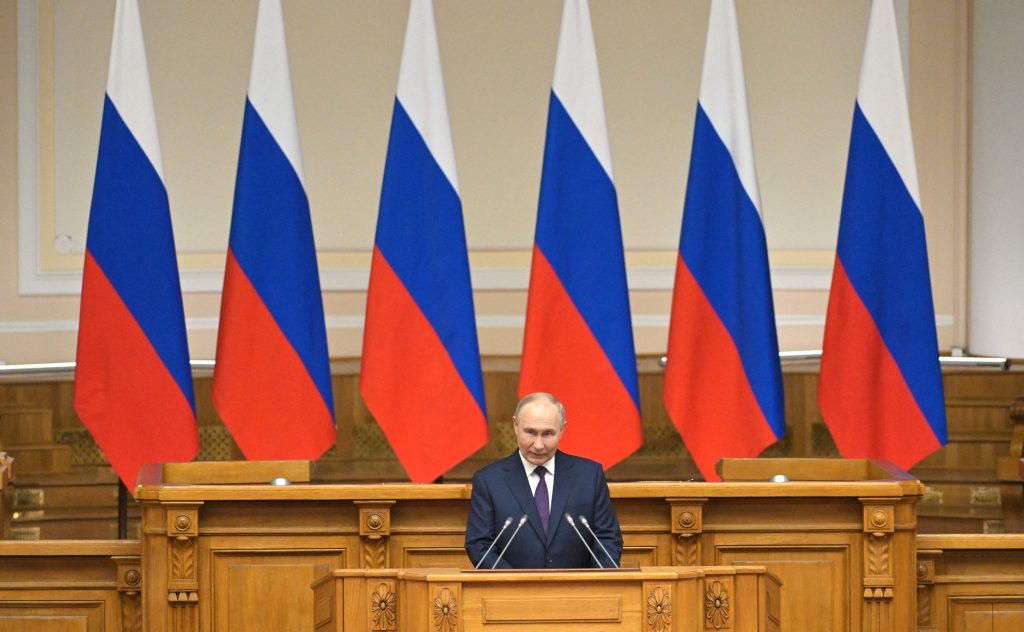
On Friday, April 26, a meeting of members of the Council of Legislators was held at the Tauride Palace in St. Petersburg. The event was timed to coincide with the Day of Russian Parliamentarism. Vladimir Putin also took part in the meeting, who addressed the meeting participants and answered their questions.
Key theses:
- Putin: “The time itself, the events through which we are passing, prove the importance of such continuity, how important it is precisely based on our original experience to strengthen parliamentarism and the socio-political system of Russia as a whole.”
- Putin: “It is necessary to ensure its stability and at the same time create conditions for openness and renewal, for fair competition between different political forces with an unconditional and clear understanding of the priority of national interests and state security and a common desire to jointly seek the most effective solutions to issues vital to people.”
- Putin: “What additional things would I like to note here? As you know, a special personnel program “Time for Heroes” has already begun. Who are these people? These are soldiers and officers who showed real character, leadership, and high human qualities in a combat situation. I am confident that they will prove themselves equally worthy in their future work in government, education, mentoring, and leading positions in all areas. I hope, dear colleagues, that political parties will actively nominate and support such candidates during election campaigns at all levels.”
- Putin: “Presidential elections took place in March of this year. The most important stage lies ahead – forming a new composition of the Russian Government. Parliament will have to exercise its constitutional powers, established in 2020 by amendments to the Basic Law and approved based on the results of the all-Russian vote.”
- Putin: “I am now addressing the heads of legislative assemblies and the chairmen of the relevant committees of the State Duma and the Federation Council. When adopting budgets and key laws, everyone needs to act in the same logic, with an understanding of the country’s general objectives, and they need to use the tools of parliamentary control to achieve the maximum, targeted effect from every decision and invested funds.”
Outcomes and outlook:
Putin’s participation in the Council of Legislators is rather a desire to show that he has not lost touch with his hometown and the St. Petersburg elites. Having convened the Council of Legislators in St. Petersburg, he once again emphasised the city’s exceptional status as a “second capital.” On April 17, Putin sent another message to the St. Petersburg elites by appointing his classmate Irina Podnosova as chairman of the Supreme Court of the Russian Federation.
- Meeting on economic issues
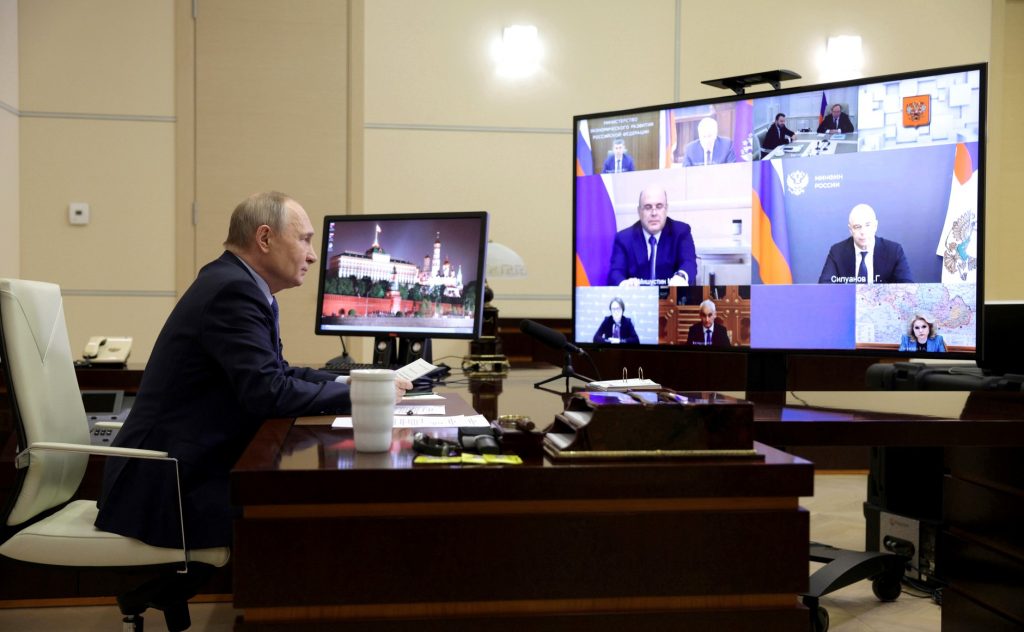
On Saturday, April 27, Vladimir Putin held an online meeting on economic issues. According to official information, the topic of the meeting was the current state of affairs in the Russian economy, in its most important industries and the field of finance. The meeting was attended by Prime Minister Mikhail Mishustin, Chief of the Presidential Administration Anton Vaino, First Deputy Prime Minister Andrei Belousov, Deputy Prime Minister Tatyana Golikova, Aide to the President Maxim Oreshkin, Minister of Economic Development Maxim Reshetnikov, Minister of Finance Anton Siluanov, Chairman of the Central Bank Elvira Nabiullina, Director of the Federal Service for Financial Monitoring Yuri Chikhanchin.
Key theses:
- Putin: “As agreed, I suggest to discuss today the current state of affairs in the Russian economy, in its most important industries and finances. In particular, I propose to pay special attention to long-term trends reflected in the forecast of the country’s socio-economic development until 2030. And this, I emphasise, is the basis, the basis for the implementation of the initiatives that were mentioned in the Address to the Federal Assembly. Today, we will also consider approaches to financing the projects and programs stated in this strategic document.”
- Putin: “I would like to note that the data from the beginning of the year turned out to be higher than the forecasts of the Government, the Bank of Russia, and even some experts. In January-February, Russia’s GDP increased by six per cent annually.”
- Putin: “The so-called calendar factor, namely the leap year and additional working days, also played a role here. But the dynamics are still good even if this factor is cleaned out and removed.”
- Putin: “Industrial activity is growing. Industrial production increased 8.5 per cent in February, which is noticeably higher than in January when the increase was 4.6 per cent.”
- Putin: “At the same time, traditionally—which is encouraging, of course—the manufacturing industries demonstrate higher rates. Their dynamics in January were 7.5 per cent, and in February, they were already 13.5 per cent.”
- Putin: “We, of course, need active actions on the part of the Government and regions that will support and stimulate business and investment activity, help open new industries, including high-tech ones, create modern jobs, satisfy the growing demand of the domestic market, firstly turn by increasing its production of goods and services – more competitive compared to foreign suppliers. We need to develop, occupy our own market, displace imports – not through administrative actions and resources, but through fair market competition.”
- Putin: “Equal opportunities must be ensured for every citizen, no matter where he lives. Everything is important here: the state of the so-called childhood infrastructure – that is, kindergartens, schools, clubs, sections and recreation camps, the development of healthcare and cultural systems, the environmental well-being of settlements and conditions for self-realisation of young people, the launch of entrepreneurial initiatives, and so on.”
- Putin: “In May, at a joint meeting of the State Council and the Council for National Projects, we will discuss the current results of this work and decide on the main approaches to achieving the goals mentioned in the Address.”
Outcomes and outlook:
The main goal of this kind of event is to show success in the economy. Russia has shown positive trends in macroeconomics, but by sector, the trends are not so rosy. The oil refining industry is close to its 11-month low. In March, Russia reduced gasoline production by 7.9% compared to last year and diesel production by 5.7%. In mid-April, Russia processed 5.22 million barrels of crude oil daily (10,000 barrels less than in early April). Over the year, Russia increased its military spending by 24% (to $109 billion). That is, over ten years these expenses increased by 57%. In 2023, defence allocations of the Russian Federation reached 16% of the state budget expenditures or 5.9% of GDP. The EU plans to impose new sanctions against Russia, and India refuses to import defence products from Russia. But these points are unlikely to be reflected in official reports.
- Russian veto on the UN Resolution on preventing an arms race in space
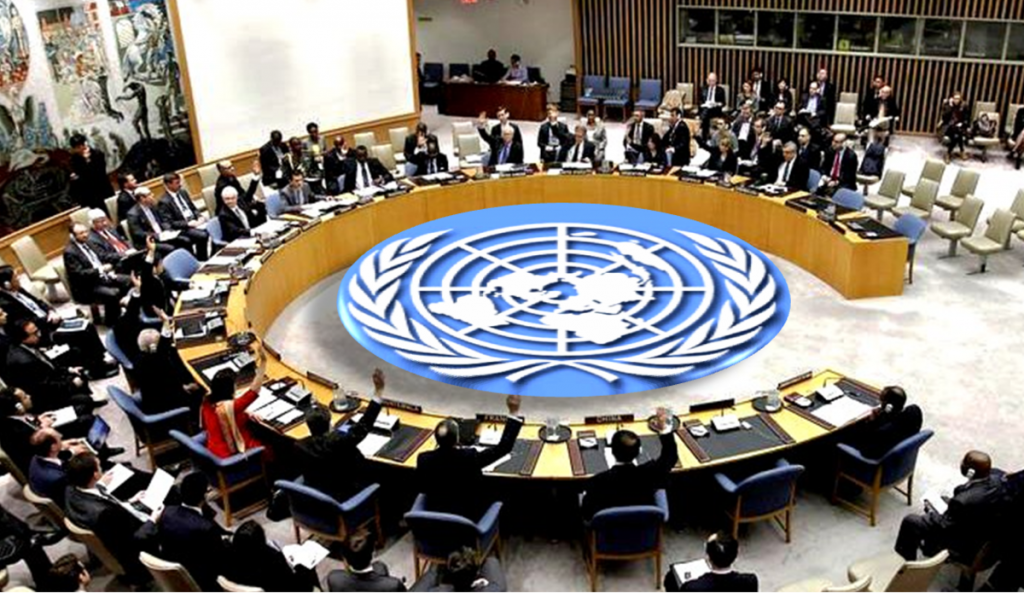
On Wednesday, April 24, members of the United Nations Security Council considered a draft resolution calling on countries to prevent an arms race in outer space. The United States developed and proposed this project. The authors note that it is based on a call for “all states, especially those with major space capabilities, to actively contribute to achieving the goal of the peaceful use of outer space and the prevention of an arms race in outer space.”
However, during the voting, the project was supported by 13 countries, and China abstained. Russia used the right of veto. The official representative of the Russian Foreign Ministry, Maria Zakharova, stated that “first of all, this was due to the fact that the fundamental amendments we proposed were ignored”:
“We confirm the Russian Federation’s strict commitment to international legal obligations in the field of space law, including the 1967 Outer Space Treaty. We emphasize our continued readiness to promptly agree on and conclude a comprehensive international legally binding agreement on the Prevention of an Arms Race in Outer Space,” Zakharova said.
US Permanent Representative to the UN Linda Thomas-Greenfield recalled that Russian President Vladimir Putin publicly stated that Russia does not intend to place nuclear weapons in space.
“If this is the case, then today’s veto begs the question: why? If you follow the rules, why wouldn’t you support a resolution that upholds them?” she said.
Outcomes and outlook:
The veto war continues. In the current conditions, any document, even the most harmless one, proposed by some members of the UN Security Council is invariably vetoed by others. At the same time, sometimes there is no common sense in using the veto right, as, for example, in this case. It is evident that the UN Security Council, as a platform for resolving important issues, will remain inactive for some time – until the major players agree and begin a gradual unfreezing process.
Last week, the United States already made a gesture of reconciliation, officially admitting that Putin did not order the murder of opposition leader Alexei Navalny. It is obvious that, in return, they expect some constructive steps from Russia. But signals may not come until after Putin meets with Xi Jinping in mid-May this year, and given that US Secretary of State Antony Blinken’s visit to Beijing (Russia’s closest ally and partner) failed, it’s hardly worth expecting de-escalation for now.

